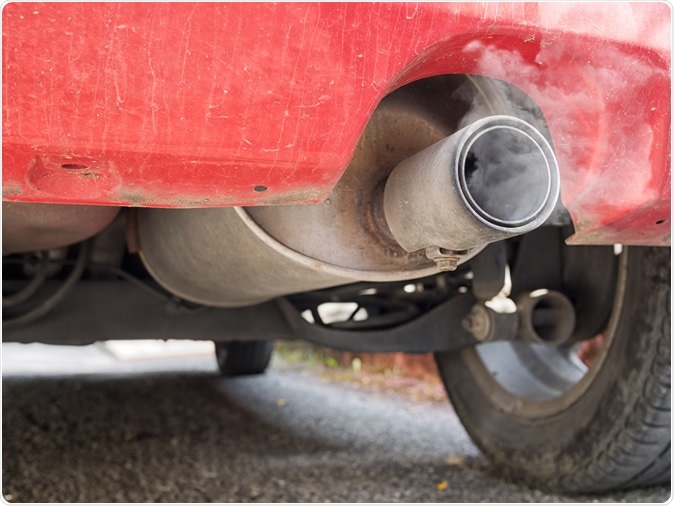Air pollution is a long-standing global problem, which is responsible for 7 million deaths each year, with 7 percent of these attributed to pneumonia.
A new study highlights how air pollution affects the airways making the body susceptible to developing the pneumococcal disease.

Old diesel vehicle: Image Credit: Sarah2 / Shutterstock
A team of researchers from the University of Liverpool has found that exposure to diesel exhaust particles (DEP) increases the susceptibility of people to developing the pneumococcal disease.
In the study published in the Journal of Allergy and Clinical Immunology, the researchers reveal that being exposed to DEPs can raise the susceptibility of contracting lung disease, particularly pneumococcal disease, which is caused by the bacterium Streptococcus pneumonia.
The bacteria is the most common cause of pneumonia and meningitis, making it the leading cause of infectious disease deaths in children under five years old and older adults across the globe. Though the bacteria can thrive in the human body, particularly in the throat and nose, without causing illness, it can become harmful when it gains access to normally sterile areas of the body, such as the blood and lungs.
When it travels to these areas, it can cause diseases, which are considered life-threatening. Pneumonia and meningitis, if not treated immediately, can lead to severe complications, including death.
How harmless bacteria progress into a severe illness
The team aimed to discover the condition that paves the way for the bacteria, which was originally harmless, become aggressive and cause severe invasive diseases.
To arrive at their findings, the team including colleagues from the Trinity College in Dublin, wanted to see the effect of air pollution, particularly the presence of DEPs in the air, on the respiratory tract.
DEPs, the particle component of diesel exhaust, including aerosols like metallic abrasion particles, ash particles, diesel soot, sulphates, and silicates, are major components of air pollution across the globe.
The team used a combination of laboratory mice models and lab-based assays in both human and mice cells, to provide a glimpse of how DEP exposure may lead to pneumococcal disease.
The results of the study show that after being exposed to DEPs, the macrophages in the airway, which are important immune cells to control bacterial infections and getting rid of debris from the body, become overwhelmed and congested with DEPs, decreasing their ability to kill the bacteria.
As a result, the macrophages can’t get rid of pathogenic bacteria that entered the airway, leading to invasion and inflammation. In some cases, the bacteria can access the blood, causing severe disease and infection. When the bacteria travel by blood into the brain, it can cause the inflammation of the meninges, called meningitis.
“We know that exposure to air pollution is harmful, responsible for millions of deaths every year, of which a significant proportion is due to pneumonia. What we did not know, however, was how pollution, such as diesel exhaust particles, actually causes airway disease." Professor Aras Kadioglu from the University of Liverpool's Institute of Infection & Global Health said.
"In this study, we have now discovered the cellular mechanisms behind this. Our study highlights an urgent need to tackle airway pollution if we are to reduce life-threatening respiratory diseases such as pneumonia,” he added.
The study provides further insight to support previous observations of increased pneumonia cases in certain countries like China where air pollution levels are highest. The researchers urge that reducing global pollution levels may help in reducing pneumococcal diseases.
“Our study shows that exposure to DEPs, which is a major airborne particulate pollutant both here in the UK and abroad, maybe one of the key factors involved in the switch from harmless pneumococcal colonization of the nasal tissues to severe diseases, such as pneumonia,” Dr. Rebecca Shears, study co-author, said.
“The reduced ability of DEP exposed airway macrophages to control the infection appears to be key in the increased number of cases of pneumococcal disease. This study adds further impetus to reduce global pollution levels,” she added.
Source:
Journal reference:
Exposure to diesel exhaust particles increases susceptibility to invasive pneumococcal disease Shears, Rebecca K. et al. Journal of Allergy and Clinical Immunology, https://www.jacionline.org/article/S0091-6749(19)31635-5/abstract